

Top Jobs for Next Decade Are Behavioral Scientist, Data Analyst. The next decade could see growing demand for behavioral scientists, data analysts, upcycled clothing designers and even digital detox consultants.
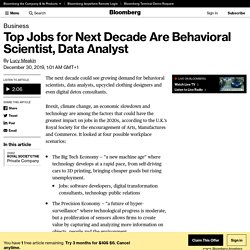
Brexit, climate change, an economic slowdown and technology are among the factors that could have the greatest impact on jobs in the 2020s, according to the U.K.’s Royal Society for the encouragement of Arts, Manufactures and Commerce. It looked at four possible workplace scenarios: Over the past 10 years, government austerity, the rise of e-commerce and an aging society have contributed to changes in employment, the report said. Computer programmers, finance directors and van drivers are among the professions that saw the biggest growth. National government administrators, bank clerks and retail workers were among those hardest hit. High Emotional Intelligence is Essential in Todays Workplace. "If your emotional abilities aren't in hand, if you don't have self-awareness, if you are not able to manage your distressing emotions, if you can't have empathy and have effective relationships, then no matter how smart you are, you are not going to get very far.
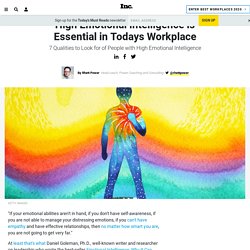
" What exactly is emotional intelligence (EI)? Psychology Today says it's: The 10+ Most Important Job Skills Every Company Will Be Looking For In 2020. As the world evolves to embrace the 4th industrial revolution, our workplaces are changing.
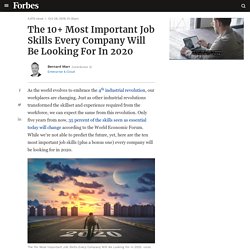
Just as other industrial revolutions transformed the skillset and experience required from the workforce, we can expect the same from this revolution. Only five years from now, 35 percent of the skills seen as essential today will change according to the World Economic Forum. VR becomes critical tool for tackling NZ skill shortages. The Ministry of Social Development is putting its weight behind Joy Business Academy (JBA) to boost virtual reality use in industry training – particularly in construction.
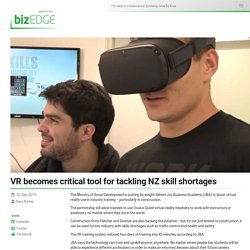
The partnership will allow trainees to use Oculus Quest virtual reality headsets to work with instructors or assessors, no matter where they are in the world. Construction firms Fletcher and Downer are also backing the initiative – but it’s not just limited to construction, it can be used for any industry with skills shortages such as traffic control and health and safety. The VR training system reduced four days of training into 45 minutes, according to JBA. JBA says the technology can train and upskill anyone, anywhere.
Top 10 important work skills in 2020: #edTech #edchat. Frances Valintine on the rise of the gig economy. Over the past few years, an evolution has occurred.

New Zealand has begun playing virtual host to a large number of international platform businesses. We’ve taken to our Lime scooters, grabbed our Onzo bikes, and ride-shared in our Ola cars. We’ve shopped online and used Afterpay to make transactions. These ‘platform businesses’ we’ve embraced with such enthusiasm operate 24-hours, every day of the year. They rely on people who can work in different time zones - offering skills from the very technical, through to customer support, logistics, and fulfilment. This new demand for flexibility has changed the very nature of “work.” We’re seeing contemporary business models move away from traditional hiring structures - enabling them to meet expansion demands, acquire short-term specialist skills, or meet peak-period demand. The 10 Vital Skills You Will Need For The Future Of Work.
Since we’re in the midst of the transformative impact of the Fourth Industrial Revolution, the time is now to start preparing for the future of work.
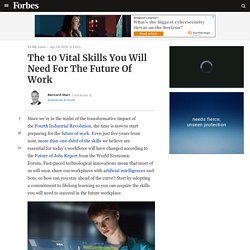
Even just five years from now, more than one-third of the skills we believe are essential for today's workforce will have changed according to the Future of Jobs Report from the World Economic Forum. Fast-paced technological innovations mean that most of us will soon share our workplaces with artificial intelligences and bots, so how can you stay ahead of the curve? Start by adopting a commitment to lifelong learning so you can acquire the skills you will need to succeed in the future workplace.
Arts Smarts: Art as a Business. Rebooting high school - Axios. 3 Reasons Why Being A Polymath Is Key In The Future Of Work. What the next 20 years will mean for jobs – and how to prepare. The next two decades promise a full-scale revolution in our working lives.
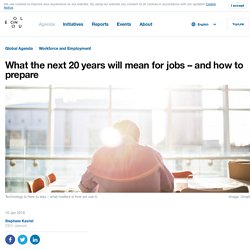
Before we look into the next 20 years, let’s take a quick look at the present – and something once considered paradoxical. We’re already living in an age of a lot of robots – and a lot of jobs. As the number of robots at work has reached record levels, it’s worth noting that in 2018 the global unemployment level fell to 5.2%, according to a report last month – the lowest level in 38 years. In other words, high tech and high employment don’t have to be mutually exclusive. We’re living the proof of that today. Given this synchronicity between employment and tech, I believe there are reasons to be hopeful that jobs will become more accessible, more flexible and more liberating over the next two decades. Here are five significant changes I foresee, as I previously highlighted for the World Economic Forum: • AI and robotics will ultimately create more work, not less.
Solution #1: Rethink education Image: Unsplash Share. Future of Jobs 2018. As the Fourth Industrial Revolution unfolds, companies are seeking to harness new and emerging technologies to reach higher levels of efficiency of production and consumption, expand into new markets, and compete on new products for a global consumer base composed increasingly of digital natives.
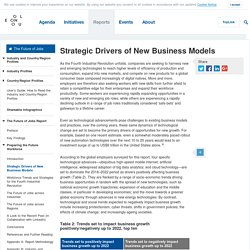
More and more, employers are therefore also seeking workers with new skills from further afield to retain a competitive edge for their enterprises and expand their workforce productivity. Some workers are experiencing rapidly expanding opportunities in a variety of new and emerging job roles, while others are experiencing a rapidly declining outlook in a range of job roles traditionally considered ‘safe bets’ and gateways to a lifetime career. The Magic Leap One, Creator Edition AR headset is ready for a reality check. But only a few people will get one.
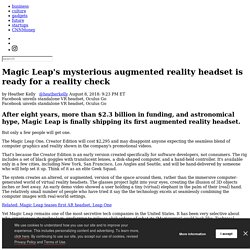
The Magic Leap One, Creator Edition will cost $2,295 and may disappoint anyone expecting the seamless blend of computer graphics and reality shown in the company's promotional videos. That's because the Creator Edition is an early version created specifically for software developers, not consumers. The rig includes a set of black goggles with translucent lenses, a disk-shaped computer, and a hand-held controller. How to prepare your kids for jobs that don’t exist yet.